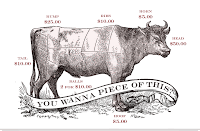I have been buried deep in my business plan, and resurfaced today to catch up on reading from my beloved Google Reader. By way of
Chris Blattman's blog, I ended up reading
Confusion Over Where Money Lent Via Kiva Goes, an article on
nytimes.com. The article raises some ethical questions in regards to charity work, in particular it looks at the current trend in charities to ask donors to contribute to a very specific need (ie a goat, a plow, a new business start up). This process appeals directly to the desires of the small donor. People want to know exactly where their money is going. However, how can the donor be sure when they purchase a plow, they are
actually purchasing a plow? Truthfully, most often they can't.
To my "cleansing of sorts." About four years ago, my husband and I had a very simple idea to raise money. I was directly linked to a community in Kenya through my work and knew that two oxen and a plow could have a huge impact on food security there. I won't go into the details. But needless to say we put together a very charming blog to promote the project to friends and family. It was a tongue in cheek take on the Kiva style fundraising- we asked them to buy a part of a cow (see below).

It was successful, we raised the money and then some. And there were visions of chickens or goats... But around this time we started receiving reports that the money already going into the community was not getting to the people. Our contact in the village was a wonderful person, but not strong enough to stand up against the powerful men in the community. Months went by and the situation never improved. So where did the money end up? It ended up financing a
girls' education project in rural Uganda. A project that has been very successful on a local scale in a community I am still in close contact with.
The bottom line is there are a multitude of factors at play. Where is the need? What if the situation changes? How much of your money actually ends up in a community? Is it enough to know your money can buy a plow, or should it actually buy a plow? Kiva is a hugely successful charity, that allows the individual donor to contribute to and learn about grassroots community development around the world. Maybe we will have to give them a break, as long as the money gets where it is needed.
